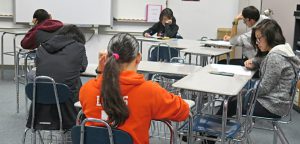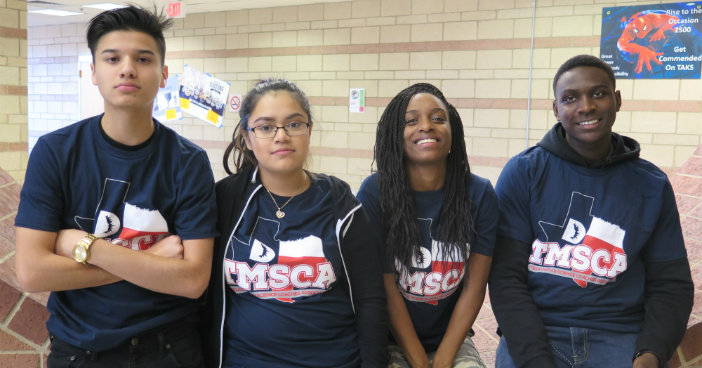 Ask researchers how to best solve thorny problems like finding safe alternatives to fossil fuels and curing devastating illnesses, and chances are they will respond that we need more scientific study and more gifted minds searching for solutions. Challenging students to test their skills in math and science is one way Dallas ISD is preparing more students to enter careers in these areas.
Ask researchers how to best solve thorny problems like finding safe alternatives to fossil fuels and curing devastating illnesses, and chances are they will respond that we need more scientific study and more gifted minds searching for solutions. Challenging students to test their skills in math and science is one way Dallas ISD is preparing more students to enter careers in these areas.
As early as elementary school, a growing number of students are attending weekend meets featuring tough math and science tests offered by the Texas Math and Science Coaches Association and coordinated by the district’s Student Activities department. At a recent high school meet, students tested their skills on rigorous timed exams featuring algebra, geometry, trigonometry and calculus problems, and their ability to operate advanced calculators and answer questions about science facts and formulas.
A TMSCA meet is certainly no walk in the park. But district administrators and teachers believe it’s the kind of experience that can give students the knowledge and self-confidence to improve their scores on state assessments and the many other tests required for college and career success.
Sharla Hudspeth, director of Dallas ISD’s Student Activities department, has raised the bar this year for the number of students participating in math and science competitions. The department kicked off the school year by teaming up with TMSCA for a daylong training session for 130 elementary, middle and high school teachers committed to serve as coaches for their schools’ math and science teams. TMSCA staffers showed the new coaches how to register teams for meets, how tests are graded, and demonstrated strategies to prepare students for competitions.
Hudspeth said the district’s investment in training, calculators and competition resources promotes the goal of Student Activities, which is to attract more students to extracurricular activities and the benefits of participation. She said the number of schools attending math and science meets at all grade levels has jumped from five last year to more than 72 this year.
“Involved students tend to have a more positive school experience than those who are not,” said Hudspeth. “TMSCA provides students the team camaraderie, interaction with a coach, and the team and individual recognition experienced in other extracurricular activities, all while building confidence in test-taking, math and science skills.”
TMSCA Director Julie Majewski-Smith said competition prepares students to perform well on standardized tests, a skill that is required to enter virtually all licensed professions.
“We do our children a disservice if we don’t teach them how to take tests and how to compete under pressure,” said Majewski-Smith. “A big part of success is not only the knowledge but knowing how to take tests and how to handle the pressure.” She says rigorous competition hones those skills and creates a group where academically talented students can feel welcome.
Students who compete also spend more time engaged in study, which means they aren’t spending time in unsupervised activities that can lead to trouble. Majewski-Smith said competition builds students’ work ethic, lets them enjoy competition, teaches them to set goals, and gives them the experience of being part of a team. “The icing on the cake is the positive recognition that comes with winning medals and ribbons and recognition for their academic skills.”
Teacher Josh Newton, who has coached several award-winning teams at the School of Science and Engineering, said the practice meets are a proving ground for success at state level competitions.
At last year’s UIL state meet, Newton’s teams won first place in calculator applications, second place in math and third place in number sense, and won several scholarships by placing among the top scorers. He said the competition also yields long-term benefits.
“Some students get really excited about math,” Newton said. “Some who go through UIL decide to become math majors in college.” The competitions build students’ math ability since the skills they learn as math team members often go beyond what’s covered in regular classes. “It also helps as they advance in math where so many of the skills build on each other. In math team, they’re taking tests a couple of times a month so they stay fresh in that material. When it comes up in their math class, they remember,” Newton said.
The schools that participated in the high school meet included L.G. Pinkston, Science and Engineering, the Judge Barefoot Sanders Law Magnet, Trinidad Garza Early College, North Dallas, and Roosevelt.
Following the tests, the 21 students from Pinkston, most of whom were first-time competitors, all agreed the exams were tough, but said they would definitely sign up for future competitions, a sentiment that pleased their coach, math teacher Gloria Valle. “It’s a new experience,” said Valle, “something I hope they’ll keep working at.”

